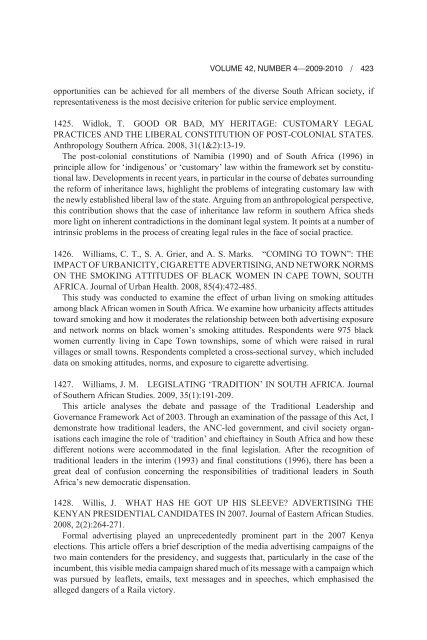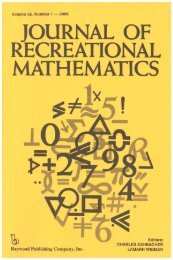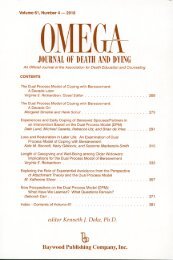A Current Bibliography on African Affairs - Baywood Publishing
A Current Bibliography on African Affairs - Baywood Publishing
A Current Bibliography on African Affairs - Baywood Publishing
You also want an ePaper? Increase the reach of your titles
YUMPU automatically turns print PDFs into web optimized ePapers that Google loves.
VOLUME 42, NUMBER 4—2009-2010 / 423<br />
opportunities can be achieved for all members of the diverse South <strong>African</strong> society, if<br />
representativeness is the most decisive criteri<strong>on</strong> for public service employment.<br />
1425. Widlok, T. GOOD OR BAD, MY HERITAGE: CUSTOMARY LEGAL<br />
PRACTICES AND THE LIBERAL CONSTITUTION OF POST-COLONIAL STATES.<br />
Anthropology Southern Africa. 2008, 31(1&2):13-19.<br />
The post-col<strong>on</strong>ial c<strong>on</strong>stituti<strong>on</strong>s of Namibia (1990) and of South Africa (1996) in<br />
principle allow for ‘indigenous’ or ‘customary’ law within the framework set by c<strong>on</strong>stituti<strong>on</strong>al<br />
law. Developments in recent years, in particular in the course of debates surrounding<br />
the reform of inheritance laws, highlight the problems of integrating customary law with<br />
the newly established liberal law of the state. Arguing from an anthropological perspective,<br />
this c<strong>on</strong>tributi<strong>on</strong> shows that the case of inheritance law reform in southern Africa sheds<br />
more light <strong>on</strong> inherent c<strong>on</strong>tradicti<strong>on</strong>s in the dominant legal system. It points at a number of<br />
intrinsic problems in the process of creating legal rules in the face of social practice.<br />
1426. Williams, C. T., S. A. Grier, and A. S. Marks. “COMING TO TOWN”: THE<br />
IMPACT OF URBANICITY, CIGARETTE ADVERTISING, AND NETWORK NORMS<br />
ON THE SMOKING ATTITUDES OF BLACK WOMEN IN CAPE TOWN, SOUTH<br />
AFRICA. Journal of Urban Health. 2008, 85(4):472-485.<br />
This study was c<strong>on</strong>ducted to examine the effect of urban living <strong>on</strong> smoking attitudes<br />
am<strong>on</strong>g black <strong>African</strong> women in South Africa. We examine how urbanicity affects attitudes<br />
toward smoking and how it moderates the relati<strong>on</strong>ship between both advertising exposure<br />
and network norms <strong>on</strong> black women’s smoking attitudes. Resp<strong>on</strong>dents were 975 black<br />
women currently living in Cape Town townships, some of which were raised in rural<br />
villages or small towns. Resp<strong>on</strong>dents completed a cross-secti<strong>on</strong>al survey, which included<br />
data <strong>on</strong> smoking attitudes, norms, and exposure to cigarette advertising.<br />
1427. Williams, J. M. LEGISLATING ‘TRADITION’ IN SOUTH AFRICA. Journal<br />
of Southern <strong>African</strong> Studies. 2009, 35(1):191-209.<br />
This article analyses the debate and passage of the Traditi<strong>on</strong>al Leadership and<br />
Governance Framework Act of 2003. Through an examinati<strong>on</strong> of the passage of this Act, I<br />
dem<strong>on</strong>strate how traditi<strong>on</strong>al leaders, the ANC-led government, and civil society organisati<strong>on</strong>s<br />
each imagine the role of ‘traditi<strong>on</strong>’ and chieftaincy in South Africa and how these<br />
different noti<strong>on</strong>s were accommodated in the final legislati<strong>on</strong>. After the recogniti<strong>on</strong> of<br />
traditi<strong>on</strong>al leaders in the interim (1993) and final c<strong>on</strong>stituti<strong>on</strong>s (1996), there has been a<br />
great deal of c<strong>on</strong>fusi<strong>on</strong> c<strong>on</strong>cerning the resp<strong>on</strong>sibilities of traditi<strong>on</strong>al leaders in South<br />
Africa’s new democratic dispensati<strong>on</strong>.<br />
1428. Willis, J. WHAT HAS HE GOT UP HIS SLEEVE? ADVERTISING THE<br />
KENYAN PRESIDENTIAL CANDIDATES IN 2007. Journal of Eastern <strong>African</strong> Studies.<br />
2008, 2(2):264-271.<br />
Formal advertising played an unprecedentedly prominent part in the 2007 Kenya<br />
electi<strong>on</strong>s. This article offers a brief descripti<strong>on</strong> of the media advertising campaigns of the<br />
two main c<strong>on</strong>tenders for the presidency, and suggests that, particularly in the case of the<br />
incumbent, this visible media campaign shared much of its message with a campaign which<br />
was pursued by leaflets, emails, text messages and in speeches, which emphasised the<br />
alleged dangers of a Raila victory.




